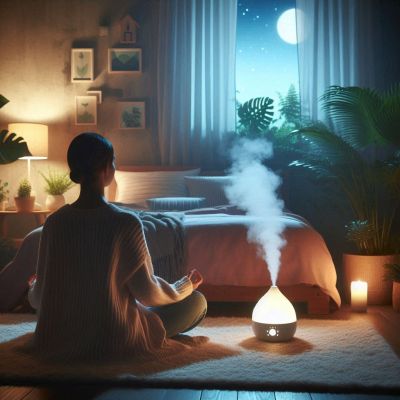Imagine sinking into a bed enveloped in tranquility, where each breath you take invites deeper rest. You might be surprised to learn that small changes in your evening routine can transform your sleep experience. From adjusting your environment to embracing relaxation techniques, there are various strategies you can implement tonight.
What if these simple tweaks could lead to a more restorative slumber than you ever thought possible? Let’s explore how to create a sleep sanctuary that works for you, enhancing your overall well-being and rejuvenation.
Optimize Your Sleep Environment
 To optimize your sleep environment, you should focus on creating a space that promotes relaxation and restfulness. Start by controlling the light in your bedroom. Consider using blackout curtains to block outside light, as this can enhance melatonin production, which is essential for sleep.
To optimize your sleep environment, you should focus on creating a space that promotes relaxation and restfulness. Start by controlling the light in your bedroom. Consider using blackout curtains to block outside light, as this can enhance melatonin production, which is essential for sleep.
Next, address noise reduction. If you live in a noisy area, try using white noise machines or earplugs to create a more peaceful atmosphere.
Your mattress choice plays a significant role in your sleep quality. Make sure it’s comfortable and supportive, as an unsuitable mattress can lead to discomfort and restless nights.
Additionally, room temperature is important; studies suggest that a cooler environment, ideally between 60-67°F (15-19°C), can help facilitate better sleep.
Incorporating scent therapy can also enhance your sleep environment. Aromatherapy with essential oils like lavender or chamomile can promote relaxation and signal your body that it’s time to wind down.
Explore Relaxation Techniques
Numerous relaxation techniques can greatly enhance your ability to unwind before bedtime. One effective method is progressive muscle relaxation (PMR). This technique involves systematically tensing and then relaxing each muscle group in your body, starting from your toes and working your way up to your head.
By focusing on the contrast between tension and relaxation, you can release physical stress and calm your mind. Practicing PMR for just 10-15 minutes can considerably lower your anxiety levels and prepare you for a restful night’s sleep.
Another beneficial technique is guided imagery, which involves visualizing a peaceful scene or experience. Find a quiet space, close your eyes, and imagine yourself in a tranquil setting, such as a beach or a serene forest.
Engage your senses by picturing the sounds, smells, and sensations of this environment. This mental escape helps reduce racing thoughts and promotes relaxation, making it easier for you to shift into sleep.
Both PMR and guided imagery can be easily integrated into your nightly routine. Set aside time to practice these techniques, perhaps after your evening wind-down activities.
By incorporating these relaxation strategies, you’re not just preparing your body for sleep; you’re also nurturing your mental well-being. Remember, effective sleep starts with a calm mind and a relaxed body.
Adjust Your Evening Diet
Adjusting your evening diet can greatly impact your sleep quality. What you eat in the hours leading up to bedtime plays a significant role in how well you rest. Incorporating herbal teas, like chamomile or valerian root, can promote relaxation and signal to your body that it’s time to wind down. These teas are caffeine-free and contain compounds that help reduce anxiety, making them an excellent choice for your bedtime routine.
Consider having light snacks if you’re hungry before bed. Foods rich in magnesium, such as almonds or bananas, can support better sleep by promoting muscle relaxation and regulating neurotransmitters that send signals to your brain.
Avoid heavy meals and high-sugar snacks, as they can lead to discomfort and disrupt your sleep cycle.
It’s also essential to establish consistent bedtime habits. Eating your last meal or snack at least two to three hours before sleep allows your body to digest properly, preventing issues like heartburn or indigestion that can keep you awake.
If you’ve been watching your diet but still struggle with sleep, it may be time to evaluate how your food choices align with your bedtime routine.
Incorporate Breathing Exercises
While adjusting your evening diet sets a solid foundation for better sleep, incorporating breathing exercises can further enhance your relaxation routine.
These techniques not only calm your mind but also help prepare your body for restorative sleep. Let’s explore effective breathing methods you can easily integrate into your nightly ritual:
-
Diaphragmatic Breathing: This technique involves deep breathing that engages your diaphragm. Place one hand on your chest and the other on your abdomen. Inhale through your nose, allowing your belly to rise, then exhale slowly through your mouth. This promotes relaxation and reduces anxiety.
-
Box Breathing: A simple yet powerful method, box breathing consists of four equal parts. Inhale for four counts, hold your breath for four counts, exhale for four counts, and then hold again for four counts. Repeat this cycle several times to calm your nervous system.
-
4-7-8 Breathing: Inhale for four seconds, hold your breath for seven seconds, and exhale for eight seconds. This technique can help reduce stress and prepare you for sleep.
-
Alternate Nostril Breathing: Close one nostril and inhale deeply through the other. Then, switch nostrils and exhale. This technique balances your body’s energy and encourages relaxation.
Incorporating these breathing exercises into your evening routine can greatly improve your sleep quality.
Establish a Consistent Routine
Establishing a consistent sleep routine can greatly enhance your overall sleep quality. When you stick to a regular sleep schedule, your body learns when to expect sleep, helping regulate your internal clock. This consistency not only aids in falling asleep faster but also improves the quality of your slumber.
Aim to go to bed and wake up at the same time every day, even on weekends. This practice reinforces your body’s natural circadian rhythm, leading to deeper, more restorative sleep.
Incorporating bedtime rituals can further optimize your routine. Consider activities that signal to your body that it’s time to wind down. This might include reading a book, practicing gentle stretches, or enjoying herbal tea.
These calming rituals help shift your mind and body into a restful state, making it easier to drift off.
You might also want to limit exposure to screens an hour before bed. The blue light emitted by devices can interfere with melatonin production, making it harder to fall asleep.
Instead, replace screen time with relaxing activities that enhance your bedtime rituals.
Conclusion
Improving your sleep quality can profoundly impact your overall health, as studies show that nearly 70 million Americans suffer from sleep disorders.
By optimizing your sleep environment, practicing relaxation techniques, adjusting your diet, incorporating breathing exercises, and establishing a consistent routine, you’re taking significant steps towards better rest.
Prioritizing these strategies not only enhances your ability to fall asleep but also supports your physical and mental well-being. So tonight, give these tricks a try and experience the difference for yourself.











